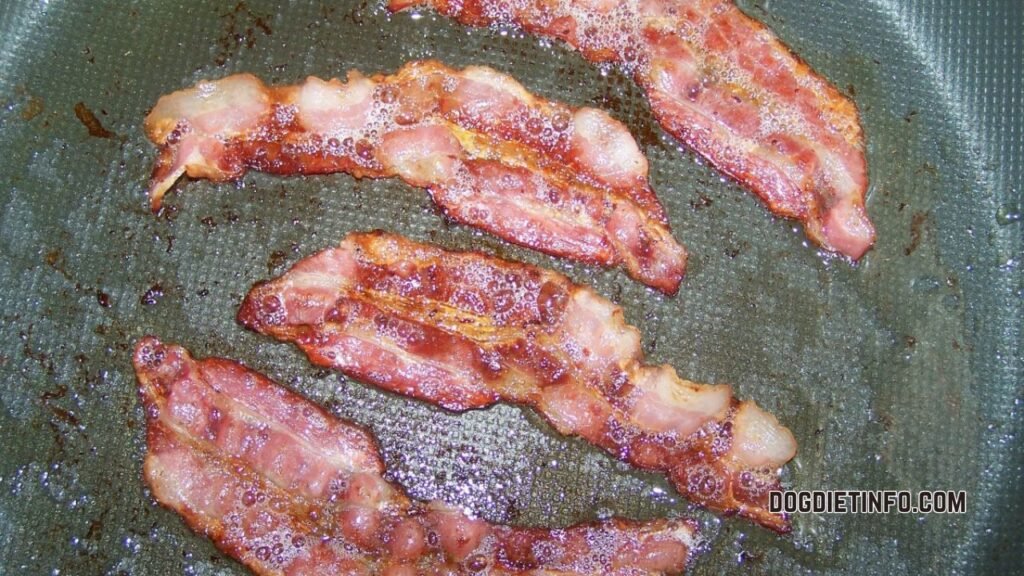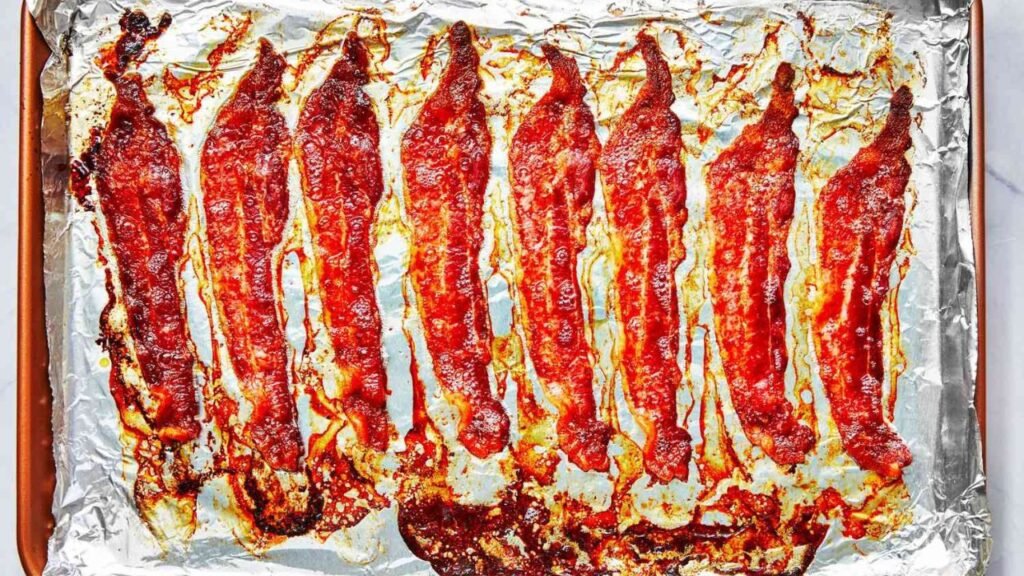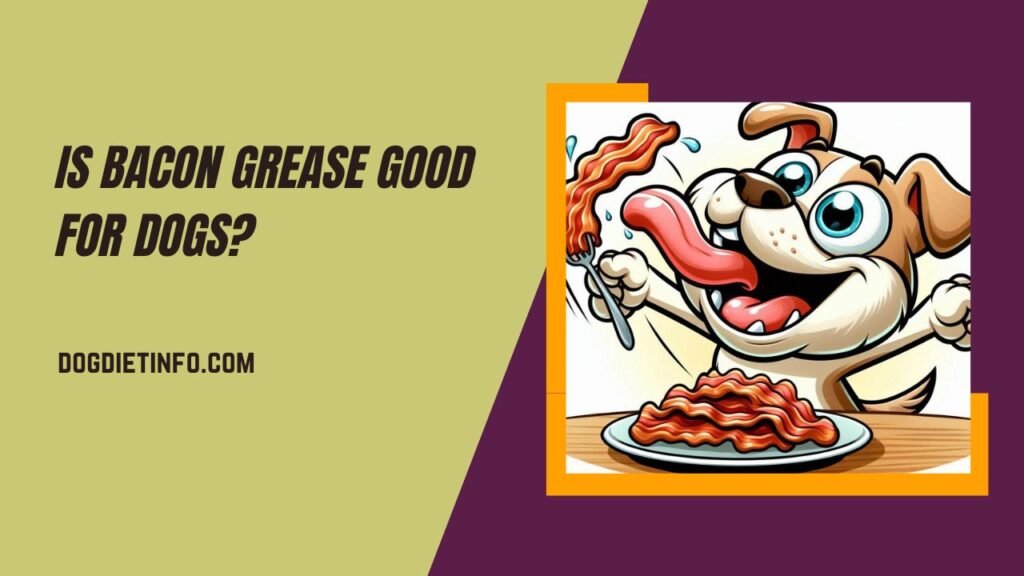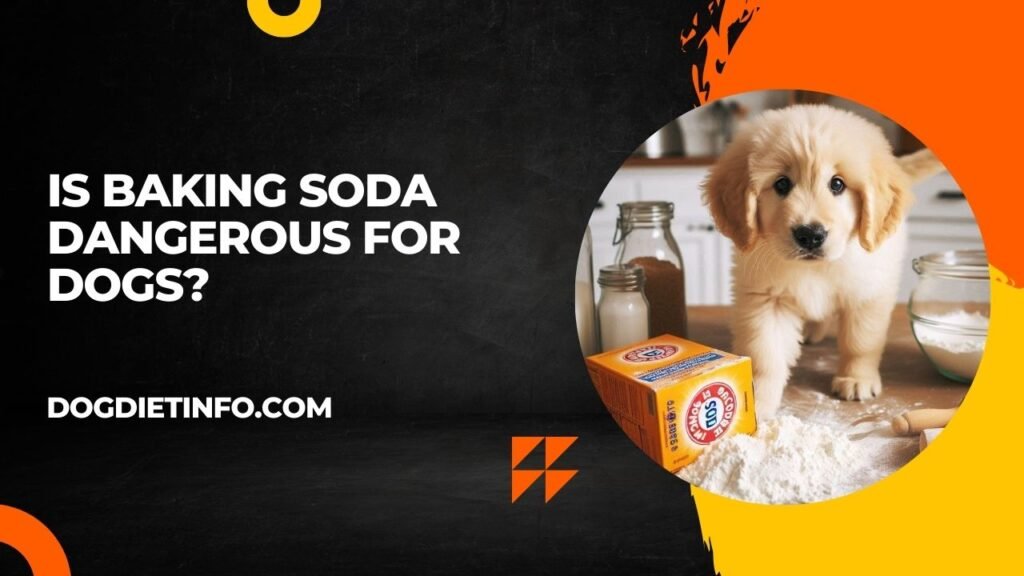Is Bacon Grease Good For Dogs? Bacon grease is not good for dogs as it can cause digestive issues, pancreatitis, and obesity.
Bacon grease is a delectable byproduct that can be found in many kitchens across the world. Because of its rich, savory flavor, it is frequently kept and used again for cooking.
Sharing a small gift with their furry pals seems natural to many dog owners, especially when it’s something as harmless as bacon grease.
But just because something tastes good to us doesn’t mean it’s safe for dogs to consume. This study will investigate the nutritional value, possible health hazards, and advantages of bacon grease for dogs.
We will also provide healthier alternatives for adding flavor to your dog’s meals. [Is Bacon Grease Good For Dogs?]
Contents
What is Bacon Grease?
Bacon grease is the fat that is rendered from bacon during the cooking process. After cooking bacon, the leftover grease solidifies into a white, creamy substance rich in flavor.
Bacon grease is frequently stored and used to enhance the flavor and depth of a variety of recipes. For humans, bacon fat can enhance the flavor profile of food; however, dogs do not benefit from this benefit.
Nutritional Content of Bacon Grease:
Bacon grease has a lot of salt and is mostly made up of saturated fats. There are almost 115 calories, 12 grams of fat, and over 20 milligrams of salt in one tablespoon of bacon grease.
Although these ingredients enhance the flavor of food for humans, they are unsuitable for a dog’s diet. Dogs do not need to eat a lot of fat or salt in their meals, unlike humans, as these foods can cause major health issues.
How Bacon Grease is Typically Used:
In human cooking, bacon grease is often used as a substitute for butter or oil to fry eggs, sauté vegetables, or add flavor to soups and sauces. [Is Bacon Grease Good For Dogs?]
In addition to its rich flavor, it’s a popular ingredient to include in dog food. But, it’s crucial to comprehend the potential health risks for your dog friend before taking any action.

Is Bacon Grease Safe for Dogs?
The short answer is no—dogs should not consume bacon grease. Dogs who are fed bacon grease may develop a number of health problems, some of which may be serious or even fatal.
High Fat Content and Its Impact on Dogs:
Fat content in bacon grease is very high, especially in saturated fat. Dogs that eat fatty foods, such as bacon grease, may have digestive problems, including vomiting, diarrhea, and upset stomachs.
A diet heavy in fat might eventually develop long-term health problems such as pancreatitis, a severe inflammation of the pancreas that can cause excruciating discomfort in the abdomen and necessitate emergency veterinarian attention.
Sodium Levels in Bacon Grease and Potential Risks:
Compared to humans, dogs require far less salt in their meals. Dogs who consume excessive amounts of bacon grease may develop sodium ion poisoning due to the grease’s high salt content.
Excessive thirst, frequent urination, vomiting, diarrhea, lethargy, tremors, and, in severe cases, seizures or coma are some of the symptoms of salt poisoning.
Because sodium intoxication can worsen quickly and necessitate emergency veterinary care, it is especially deadly.
Risk of Pancreatitis from Consuming Bacon Grease:
An excessively fatty diet is frequently the cause of pancreatitis, a disorder marked by inflammation of the pancreas.
For dogs, this is an extremely painful ailment that, if left untreated, can result in severe vomiting, dehydration, stomach agony, fever, and even death.
Due to its high fat content, bacon grease is frequently the cause of canine pancreatitis, especially in breeds like Shetland Sheepdogs, Miniature Schnauzers, and Yorkshire Terriers that are already predisposed to the illness.
Obesity Concerns Linked to Bacon Grease Consumption:
Frequent ingestion of high-fat meals such as bacon grease can be a major cause of obesity in dogs. Veterinarians and pet owners alike are becoming increasingly concerned about obesity.
Dogs that are obese or overweight have an increased chance of developing diabetes, joint difficulties, cardiovascular disorders, and shorter lifespans.
Over time, giving your dog bacon grease—even in little amounts—can lead to unhealthful weight growth.
Potential for Toxicity in Certain Breeds or Health Conditions:
Certain dog breeds are more prone than others to the negative effects of eating foods high in fat because of their inherited traits or pre-existing medical issues.
Dogs that are prone to pancreatitis, kidney disease, or cardiac issues should completely avoid high-fat foods like bacon grease.
Their health problems can be made worse by even tiny amounts, which can result in consequences that need long-term medical attention.
Are There Any Benefits of Bacon Grease for Dogs?
While feeding dogs bacon grease has a number of serious hazards, others could counter that there might occasionally be a little advantage.
These advantages do, however, have significant limitations and are uncommon. [Is Bacon Grease Good For Dogs?]
Flavor Enhancement for Picky Eaters (with caution):
To tempt finicky eaters or persuade them to eat their usual dog food, some dog owners might think about adding a small quantity of bacon fat to their diet.
A tiny amount could improve the flavor and appeal of the cuisine. Even in these situations, though, the quantity must be small, and this kind of behavior should only occur sometimes rather than regularly.
To avoid health hazards, bacon fat should never be used as a taste enhancer without veterinary supervision. [Is Bacon Grease Good For Dogs?]
Occasional Treat vs. Regular Diet Inclusion:
It shouldn’t be a frequent part of a healthy dog’s diet, but an occasional lick of bacon grease might not be harmful.
Even infrequent consumption of fat and sodium can have cumulative effects that can have long-term implications, especially in older dogs or those with underlying medical issues.
Any possible flavor benefits are greatly outweighed by the hazards. [Is Bacon Grease Good For Dogs?]

Healthier Alternatives to Bacon Grease for Dogs
If you want to add some flavor to your dog’s diet or make their meals more exciting without risking their health, consider these healthier alternatives:
Olive Oil or Fish Oil:
A dog’s diet can benefit from the safe and healthful addition of a little amount of fish or olive oil. Omega-3 fatty acids, which are abundant in these oils, are good for a dog’s skin, coat, and general health.
Because of their anti-inflammatory qualities, omega-3 fatty acids can help maintain joint health, especially in senior dogs.
Plain Cooked Chicken or Turkey Fat:
A tiny quantity of cooked chicken or turkey fat can be used instead of bacon oil, and it’s far healthier. [Is Bacon Grease Good For Dogs?]
These lean meats are less prone to result in obesity or digestive problems and have a more balanced fat profile. Make sure the meat is always devoid of flavor, as certain spices may be harmful to dogs.
Vegetable-Based Additions:
Vegetables that are good for dogs, such pumpkin, peas, and carrots, can also be added to their diets to vary things up without hurting them.
Because these vegetables are high in fiber and low in fat, they improve digestion and general health.
Low-Sodium Broth:
Instead of adding bacon fat to your dog’s food, you can improve the flavor by adding a small amount of low-sodium chicken or beef broth.
Verify that the soup doesn’t contain any additions that could be harmful to dogs, such as onions or garlic. [Is Bacon Grease Good For Dogs?]
Final Verdict
With its high fat and sodium content, bacon grease is not a good addition to a dog’s food since it can cause pancreatitis, obesity, digestive problems, and other serious health consequences.
The risks of giving your dog bacon grease exceed any potential advantages, even though it can give their food more flavor. [Is Bacon Grease Good For Dogs?]
As responsible pet owners, we must prioritize the health and happiness of our animals by giving them safer and healthier food options.
If your dog needs flavor and nutrients, think about using fish oil, olive oil, or simply cooked chicken as better substitutes for bacon grease.
Before adding new items to your dog’s diet, always get advice from your veterinarian, especially if your dog has any dietary restrictions or underlying medical issues.
FAQs
Can a small amount of bacon grease hurt my dog?
Even a small amount of bacon grease can upset a dog’s stomach and potentially cause pancreatitis, especially in breeds predisposed to this condition. It’s best to avoid it altogether.
What should I do if my dog accidentally consumes bacon grease?
If your dog accidentally ingests bacon grease, monitor them closely for any signs of distress, such as vomiting, diarrhea, or abdominal pain. If any symptoms appear, contact your veterinarian immediately.
Are there safe ways to use bacon flavor in dog treats?
Instead of bacon grease, consider using bacon-flavored dog treats specifically designed for pets. These treats are formulated to be safe and healthy while offering a similar flavor profile that dogs enjoy.
What are signs of pancreatitis in dogs?
Signs of pancreatitis in dogs include vomiting, diarrhea, loss of appetite, abdominal pain, fever, and lethargy. If you notice these signs, seek veterinary care immediately. [Is Bacon Grease Good For Dogs?]
What other human foods are dangerous for dogs?
Foods like chocolate, grapes, raisins, onions, garlic, macadamia nuts, and anything containing artificial sweeteners (such as xylitol) are highly toxic to dogs and should be avoided at all costs.
Conclusion: Is Bacon Grease Good For Dogs?
It’s important to choose foods that promote your dog’s general health and wellbeing when determining what foods to feed them.
Giving them a taste of bacon grease could be enticing, but there are just too many risks involved. [Is Bacon Grease Good For Dogs?]
Adhere to a wholesome, well-balanced diet customized for their requirements, and seek guidance from your veterinarian regarding suitable and safe food selections.
In order to ensure that your dog lives a long, healthy, and happy life by your side, their health and happiness should always come first.

Derrick Wilcox is a certified canine behaviorist with over 12 years of experience at Happy Paws Animal Clinic and Pawsitive Training Center, helping pet owners ensure safer, healthier, and happier lives for their dogs.



